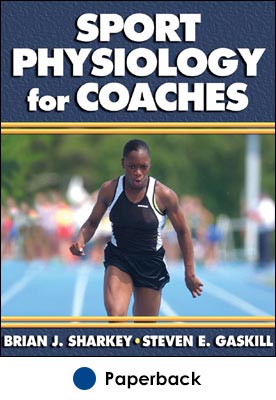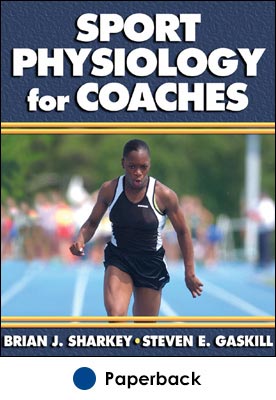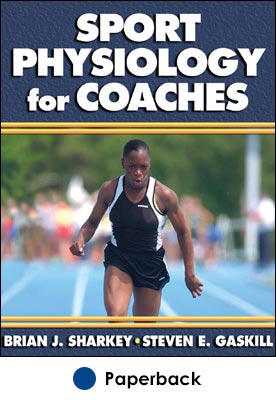Sport Physiology for Coaches
Author: Brian J. Sharkey, Steven E. Gaskill
$9.98 CAD
Sport consists of preparation and performance—about 99 percent preparation, 1 percent performance. You know the importance of physical fitness in sport, but do you know how to train your athletes to perform at their best?
Sport Physiology for Coaches is designed to help coaches assess, refine, enhance, and improve athletes' performance through an applied approach to exercise physiology. Written primarily for high school coaches, this practical, user-friendly text not only covers training essentials for muscular and energy fitness, but it also provides the hands-on assessments, forms, and training plans to help you implement the concepts in your training sessions.
To guide you in the development of a training program for your sport, the book features sample programs for sports involving skill, power, power endurance, intermittent activity, and aerobic activity. You'll learn the principles behind development of muscular and energy fitness, differentiate between myth and science, and glean the latest training techniques and lessons from science and top coaches. In the end, you'll come away with a systematic approach and integrated training plan for developing your athletes' energy and muscular fitness. With Sport Physiology for Coaches, you'll discover how knowledge of sport physiology and training can contribute to your athletes' success and to your understanding and enjoyment of coaching.
Sport Physiology for Coaches serves as the text for the American Sport Education Program (ASEP) Silver Level course, Sport Physiology for Coaches.
Preface
Acknowledgments
Part I The Athlete, the Coach, and Sport Physiology
Chapter 1 Introduction to Sport Physiology
Sport Physiology
Sources of Information
Summary
Key Terms
Review Questions
Practical Activities
Chapter 2 Principles of Training
Principles of Training
Fallacies of Training
Summary
Key Terms
Review Questions
Practical Activities
Chapter 3 Individual Response
Heredity
Maturation
Other Factors
Summary
Key Terms
Review Questions
Practical Activities
Part II Muscular Fitness Training
Chapter 4 Muscular Fitness: Strength, Power and Endurance
Muscle Function, Movement, and Control
Muscle Structure and Contraction
Muscles and Movement
Heredity Versus Training
Muscular Fitness
Summary
Key Terms
Review Questions
Practical Activities
Chapter 5 Assessment of Muscular Fitness
Designing Appropriate Tests
Administering Tests
Sample Tests
Summary
Key Terms
Review Questions
Practical Activities
Chapter 6 Developing Muscular Fitness
Resistance Training Basics
Resistance Training Terms
Organizing a Strength Training Program
Developing Strength
Developing Power
Developing Power Endurance
Periodization and Progression
Improving Speed
Improving Flexibility
Improving Agility and Balance
Summary
Key Terms
Review Questions
Practical Activities
Part III Energy Fitness Training
Chapter 7 Energy Systems: Aerobic and Anaerobic
Energy Systems
Specific Training
Summary
Key Terms
Review Questions
Practical Activities
Chapter 8 Assessing Energy Fitness
Energy Requirements and Training
Anaerobic Power
Aerobic Energy Fitness
Summary
Key Terms
Review Questions
Practical Activities
Chapter 9 Developing Energy Fitness
Overload
Duration of Energy Training
Summary
Key Terms
Review Questions
Practical Activities
Part IV Designing Training Programs
Chapter 10 A Systematic Approach to Training Program Development
Goal Setting and Needs Analysis
Periodize the Training Program
Weekly Periodization
The Weekly Plan
Monitor Your Athletes
Summary
Key Terms
Review Questions
Practical Activities
Chapter 11 Sample Training Programs
Skill Sport: Golf
Power Sport: Football Lineman
Power Endurance Sport: Wrestling
Intermittent Sport: Soccer
Aerobic (Endurance) Sport: Cross Country Running
Summary
Key Terms
Review Questions
Practical Activities
Chapter 12 Performance and Health
Health Behaviors
Other Behaviors
Overtraining
Career Development
Multi-year Planning
Summary
Key Terms
Review Questions
Practical Activities
Appendix A Flexibility Exercises
Appendix B Exercises for Core Training and Specific Muscle Groups
Appendix C Plyometric Training Exercises
Appendix D Designing Appropriate Tests
Appendix E Using Training Impulse Guidelines (TRIMPS) to Plan Training
Appendix F Answers to Review Questions
Appendix G Answers to Practical Activities
Appendix H Suggested Readings
Glossary
References
Index
About the Authors





